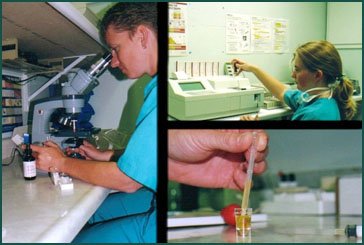As in human medicine, the anesthetics available for anesthetizing our companion pets are extremely safe. As a result, the anesthetic risk is greatly minimized when a “healthy” pet is placed under anesthesia. However, if your pet is not “healthy”, complications can occur both during and after the anesthetic procedure. Therefore, in order to minimize the potential risk associated with anesthesia, it is vital for us to know the complete health status of your pet before placing him or her under anesthesia.
Prior to anesthesia, we will obtain a history and perform a physical exam on your pet. While history and physical provide us with important information about your pet’s health, it is impossible to understand the complete physiological picture without performing other tests.
In most cases, if a pet appears “healthy” based on physical exam and history, an anesthetic procedure will be uneventful. However, unlike humans, pets cannot tell us when they do not feel well. And as a result of an animals’ instinct to protect themselves, oftentimes sick pets will “hide” their illness. Therefore, an animal’s appearance of health may be misleading. For example, a pet may lose up to 75% of kidney function prior to showing any signs of illness. To understand your pet’s overall health it is important to derive additional information through testing prior to anesthesia.
If the results of pre-anesthetic tests are within normal ranges, we can proceed with confidence knowing the anesthetic risk is minimized. On the other hand, if the results are not within the normal ranges, we may alter the anesthetic procedure. In some cases, we may proceed as planned, yet provide medical support during and after the procedure to ensure your pet’s health. In other cases, the test abnormalities may be significant enough to postpone the procedure in order to monitor and medically treat your pet.
Although performing these tests cannot guarantee the absence of complications, it can significantly minimize the risk to your pet and provide you and us with peace of mind.
These are some of the tests which may be recommended for your pet:
Blood Chemistry
Blood chemistry tests provide information concerning your pet’s vital organs such as the liver, kidneys, pancreas, thyroid, parathyroid and intestinal tract.
Complete Blood Cell Count (CBC)
The CBC provides information concerning the various types of blood cells. The red blood cell (RBC’s) carry oxygen to the tissues of the body. White blood cells (WBC’s) are the body’s primary defense against infection. Platelets play a major role in the blood clotting process and are essential for halting the bleeding process.
Electrolytes
In order to maintain life, the appropriate balance of electrolytes is vital. Certain diseases or conditions may result in electrolyte imbalances that could compromise a pet’s health and ultimately become life threatening.
Other tests
Depending on your pets’s age, history and physical exam, other tests may be recommended such as a EKG (electrocardiogram), thyroid profile or urinalysis.




